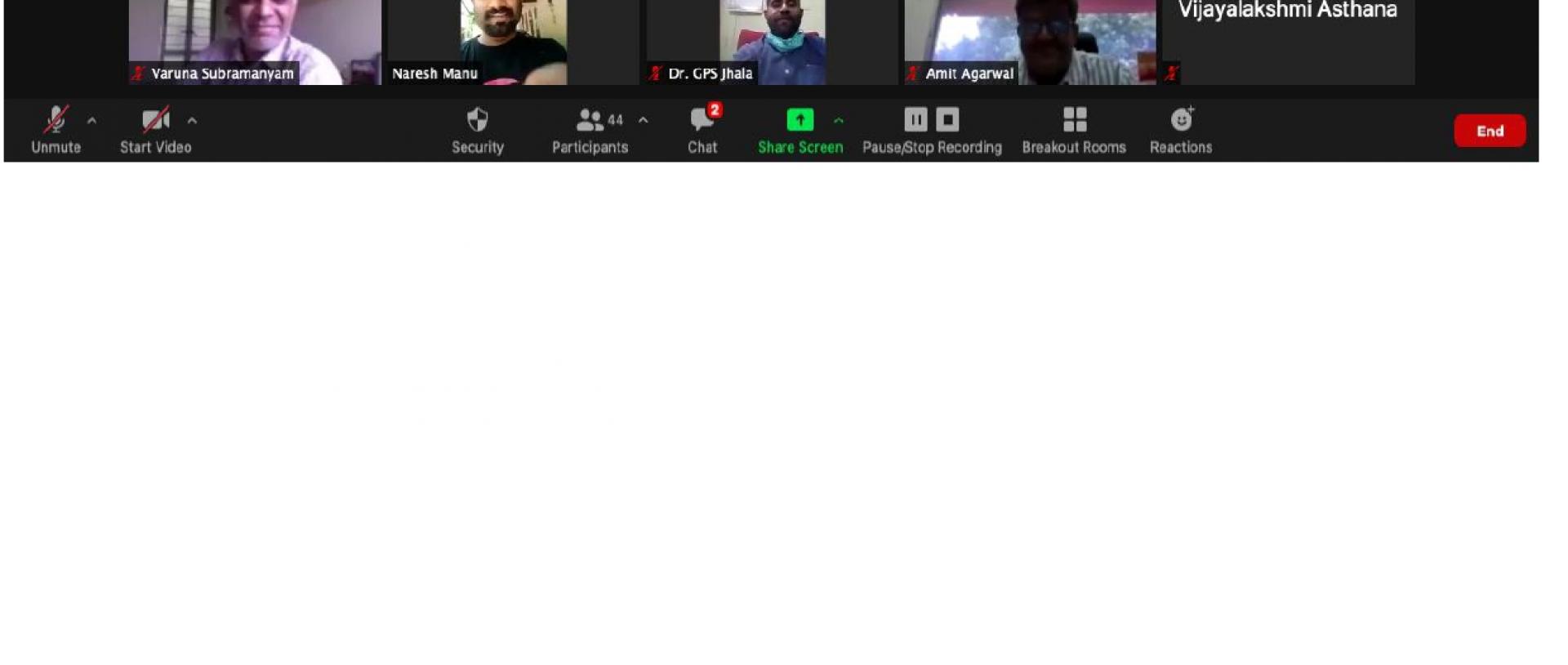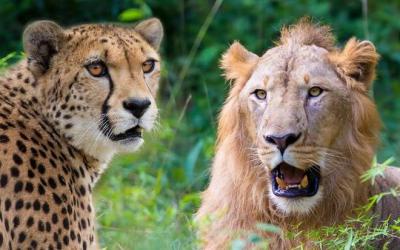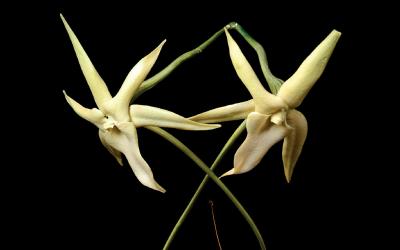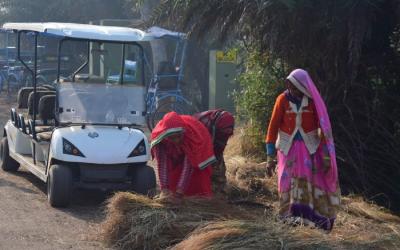A REPORT ON THE VIRTUAL CONSULTATIVE MEETING
INTER-STATE CONSULTATION ON “DEMONSTRATE THE POTENTIAL APPLICATIONS OF THE MULTI-FACED CITIZENS PORTAL ON MEDICINAL PLANTS”
Held on
Dated: 27TH March 2021
The University of Trans-Disciplinary Health Sciences and Technology
(A State Private University Established by Karnataka Act 35 of 2013)
#74/2, Jarakabande Kaval, Post Attur via Yelahanka, Bengaluru, Karnataka
1. About Citizens’ Portal on Medicinal Plants
The Citizens’ Portal on Medicinal Plants (CPMP) was planned to democratize and unleash the rich heritage and culture of medicinal plants for the well-being and benefit of the human, animal and crop health. India has a rich cultural heritage of traditional health practices that uses locally available material to sustain health and cure diseases.
The CPMP has been planned to be an online platform that will aggregate and curate medicinal plants data from traditional and scientific literature and local health traditions. It will foster collaboration and will allow active participation of stakeholders. The medicinal plants data includes:
- nomenclature of the ingredients (scientific name, local names, basonyms, names as in pharmacopoeia)
- preventive, curative, promotive capability of these ingredients
- the distribution of ingredient plants, and
- the process to make a formulation / medicine and the application of those formulations.
This portal will allow citizens to search for ailments and cure based on local resources, the availability and distribution of medicinal plants and ingredients, and provides advice for addressing the issue of human, animal and crop health.
2. States participated:
Karnataka, Rajasthan, Chhattisgarh, Maharashtra and Sikkim
3. Stakeholders:
A total of 78 participants from State Forest Departments, State Medicinal Plant Boards, State Biodiversity Boards, Civil Society Organizations, CBOs, R&D Organizations, Universities, Researchers, Educators, Farmers, Folk Healers, Veterinary doctors and Ayurvedic physicians of the five States attended the consultation.
4. Highlights of the discussion:
4.1. Dr. M. Abdul Kareem, Head, Centre for Conservation of Natural Resources, TDU gave a warm welcome to the participants and provided a brief introduction on the purpose of the consultation. Further, he shared the structure and scope of the webinars as anchor.
4.2. Dr. Ravi Chellam, CEO, Metastring Foundation gave a brief introduction on “National Mission on Biodiversity and Human Well Being. He explained in detail the history and the current status of the mission. (https://youtu.be/1vEqs_WU3UY). He also highlighted that the mission is one among the 9-missions which got approved between October 2018 to January 2019 by Prime Minister's Science, Technology, and Innovation Advisory Council (PM-STIAC) and till date the mission had 4 National consultation and 6 thematic consultations.
4.3. Shri. Darshan Shankar, VC, TDU informed that the CPMP is a part of Biodiversity and Health, which is one of the sub-components of the Mission.
He informed that medicinal plants are used by multiple stakeholders. The largest users of medicinal plants are local communities and villagers of the country. The medicinal plants are used for human, animal and crops health. India has probably one of the richest biocultural heritages in the world. Around 6500 species are used across various ethnic communities in the country. This rich bio-cultural heritage is eroding parallelly due to various factors and lack of documentation.
This program – Citizens’ Portal is an important initiative for the prevention of erosion of biocultural heritage. This will be an important tool to revitalize the great bio-cultural heritage of India. It will also be useful to a wide range of stakeholders. At households, self-help solutions, presence of medicinal plants, associated traditional knowledge of human, animal, and crops health. In addition to this it will also play a big role in education sectors like schools and colleges to appreciate the TK, health and livelihood security for local communities and to enterprises through value-added products and also local conservation strategies by forest managers for those threatened medicinal plants.
4.4. Sri Prabhakaran, Director, Strand Life Sciences, Bangalore & Shri Varuna, Head, Centre for Traditional Knowledge, Data Sciences & Informatics, TDU, Bangalore presented the draft structure of the CPMP, the major emphasis are as follows:
- Enable collection and curation of information related to medicinal plants from various sources. The portal will be available on mobile devices and in local languages thus making it easy to engage any citizen / local traditional health practitioner to interact with the portal.
- Aggregate and curate data on human, animal and plant health incrementally each year, from various sources - such as, classical texts (Ayurveda, Siddha, Sowa-Rigpa, Unani); scientific papers; public domain science and medical databases as well as documented local health traditions, with support of a small network of dedicated nodal knowledge centres, including community-based organisations
The portal architecture will be based on micro services architecture.
Suggestions/Comments:
- Dr. Mohankumar Thambad, SVYM expressed his concern about the portal - there are already many Citizens’ portals available, what is the use of those who are living in the remote areas where there is no internet access or not familiar with modern gadgets and also affordability. So, such communities, what is your plan to reach them?
- There was a suggestion that healthy life – food and diet also play a role, what is the planning for them?
- There was concern if Citizens’ portal is free, how do you prevent biopiracy? And its information, how do you validate the data.
- Is this portal also linked with TKDL (Traditional Knowledge Digital Library) Ayurvedic Aushidhi aspects?
- There was a question by Dr. Vishwa Janani, how is it different from the TKDL database?
- There was concern on how to curate the data and ensure that the information fed in the portal is reliable?
4.5. Capacity-building workshops for various stakeholders in the National mission to enrich the CPMP information were presented by Dr. Chetan, HC, Associate Professor, Centre for Conservation of Natural Resources. He explained details of each stakeholder, number of participants, number of workshops, and the day-to-day involvements in a year. The major stakeholders are Folk healers, TK organisation, Schools, ePBR at SBB of each state, and State Forest Department for MPCAs Management.
Suggestions/Comments:
- Dr. Sunil Dubey wanted to know about any provision for training for those traditional medicine practitioners who have their own knowledge system which they have been practicing? How their knowledge is going to be documented, and if so, how shall they be able to hold their copyright?
5. General suggestions and comments
The Q and A session was moderated by Dr. A.K. Gupta, TDU.
- Mr. Manoj Semwal, what would be the approach for inclusion of various other stakeholders like CSIR already working in Medicinal Plants as well as traditional knowledge?
- Dr. Visvajanani, highlighted that there is a similarity between TKDL and Citizen Portal, TKDL has sent a cabinet note to open up for public use. Should we repeat the same work? Does the cabinet note submit by the mission state explicitly that TKDL also has the objective to reach a larger public? Is the cabinet note having the idea of giving the oral traditional knowledge to the public? Monitoring the access of the database. How does a citizen portal conduct surveillance on the use of information?
- Mr. Arun Pandey IFS, asked who will be responsible to take this mission forward at State Level? Is it SBB or SMPB?
- Mr. Hariramamurthi, asked will the database be accessible in different vernacular, through mobile and supported by voice and images? Citizens and folk healers may not be able to use the textual queries. Hence, this needs attention.
- Mr. Devendra opined most of the information on Medicinal plants like particular parts of plants has been used in particular diseases but not shown how much and any other ingredients.
- Dr. Divya Raj appreciated the mission plan, however, his concern was what are the strategies for gathering inputs from remotest of the regions and how can it be made effective easy-to-use?
- Dr. Narendra Kumar raised a concern that if the database contains the specific location of RET species, then how to protect them from overexploitation?
- Dr. Sunil Dubey raised his enquiry, that he had participated and contributed in the workshop organised for MPCAs in 2008, but after that was not been actively involved or updated regarding any development of MPCA or related things afterwards. Is that same fate going to happen with traditional medicine practitioners?
- Dr. GPS Jhala,: Is there any corner reserved effectively for folk healers? if yes, then what specific part of this portal is dedicated to them?
- Ms. Sunita K Sreedharan: How does this excellent system tie in with the biodiversity laws more specifically the Biodiversity Management Committee under Section .41?
6. Abbreviations
CPMP - Citizens’ Portal on Medicinal Plants
MP - Medicinal Plants
MPCA - Medicinal Plants Conservation Area
SMPB - State Medicinal Plants Board
CBOs - Community based Organisation
TDU - The University of Trans-Disciplinary Health Sciences & Technology
e-PBR - electronic-People’s Biodiversity Register
TKDL - Traditional Knowledge Digital Library
FRLHT- Foundation for Revitalization of Local Health Traditions
SBB - State Biodiversity Board
CSIR - Council of Scientific and Industrial Research
RET - Rare Endangered Threatened
List of participants:
Sl.No
Name
From
1.
Mr. Jagannatharao. R
Assistant Professor, CCNR, TDU, Bangalore
2.
Dr. D. Srinivasa Reddy
Director, Council of Scientific & Industrial Research, Jammu
3.
Dr.Sabita Dahal
President,
Himalayan Science Society,
Gangtok, Sikkim
4.
Mr.Devendra Kumar Bhardwaj
Consultant(Tech.)
SBB, Rajasthan
5.
Dr.Manoj Semwal
CSIR-Central Institute of Medicinal and Aromatic Plants (CSIR-CIMAP)
6.
Mr. Dhruv Gangadharan
Assistant Programme Officer
Mission Secretariat,
National Mission on Biodiversity and Human Well-Being
7.
Dr. Abdul Kareem
Associate Professor
HoD, CCNR,TDU, Bangalore
8.
Dr. Chetan
Associate Professor, CCNR,
TDU, Bangalore
9.
Mr. Ravi Chellam
CEO, Metastring Foundation,
Biodiversity Collaborative &
Director of the Mission Secretariat,
Preparatory Phase Project of the National Mission on Biodiversity and Human Well-Being
10.
PCCF
Principal Chief Conservator Of Forest (Head of Forest Force), Chhattisgarh
11.
Member Secretary
Chhattisgarh Biodiversity Board
12.
Dr. Rohini M.R
Scientist, Division of Flower and Medicinal Crops, ICAR-IIHR, Bengaluru
13.
Dr. GPS Jhala
The CEO
Seva Mandir
Rajasthan
14.
Mr. Naresh NK
Administrative Assistant, CCNR, TDU, Bangalore
15.
Mr.Narpat Shekhawat
Retired professor of botany
16.
Prof. Darshan Shankar
Vice Chancellor, TDU, Bangalore
17.
Dr.M.L.Changwal
Medicinal plant expert
18.
Dr. Narendra Kumar
CSIR-Central Institute of Medicinal and Aromatic Plants (CSIR-CIMAP)
19.
Mr. Mangal Bir Subba
Folk Healer, Yoksum, West Sikkim
20.
Dr. Vijayalakshmi Asthana
Head, CSIR-Traditional Knowledge Digital Library Unit.
21.
Mr. Prabhakar
Director, Strand Life Sciences, Bangalore
22.
Mr.Varuna Subramanyam
Head, Centre for Traditional Knowledge, Data Sciences & Informatics, TDU, Bangalore
23.
Dr.M N Balakrishnan Nair
Emeritus Professor ,TDU, Bangalore
24.
Dr. Debabrata Saha
Assistant Prof. TDU, Bangalore
25.
Mr. Hem Lal Sharma
Folk Healer
Assam Lingzey, East Sikkim
26.
Dr. Atul Kumar Gupta
Registrar & Dean, TDU, Bangalore
27.
Dr.Amit Agarwal
Director, Natural Remedies, Bangalore
28.
Dr. Soundrapandi
National Biodiversity Authority, Chennai
29.
Mr.Mahesh
NCBS
30.
Sunita K Sreedharans
SKS Law Associates
31.
Pushp Jain (Himal Jain)
Med Herb
32.
Dr.A Balasubramanian
Director,
Center for Indian Knowledge Systems Chennai.
33.
Dr.Mohankumar Thambad
Operational Manager, SVYM,HD Kote
34.
Dr Ravi Tembhare
35.
Prof Ashwini Kumar Dixit
Department of Botany
Guru Ghasidas Central University
Vidysagar Nagar, Koni, Bilaspur,
36.
Mr.BS Somashekhar
Assistant Prof., CCNR,TDU, Bangalore
37.
Dr. C. N. Vishnuprasad
Associate Professor, TDU, Bangalore
38.
Jaya N. Sharma
UNDP, Sikkim
39.
Milan Mehta
40.
M Vijay Scientist-C
RMNH, Mysore
41.
Anita jain
Lecturer
Dept. of Botany
Vidhya Bhawan Rural Institute
Udaipur
42.
Divya raj
E-Health Research Center (IIIT-Bangalore)
43.
Dr.Viswajanani Sattigeri
Head, CSIR-Traditional Knowledge Digital Library Unit
44.
Dr. Prabodh Trivedi
Director, CSIR-Central Institute of Medicinal and Aromatic Plants (CSIR-CIMAP)
45.
Mr. Nishanth Gurav
Junior Research Fellow ,CCNR, TDU, Bangalore
46.
Dr.Mandar Datar
Agharkar Research Institute
47.
Kanchan ponkshe
48.
Dr.Subrahmanya Kumar
Assistant Professor, TDU, Bangalore
49.
Dr.Suma Tagadur
Assistant Professor, CCNR,TDU, Bangalore
50.
Dr.Hariramamurthi
Head
Centre for Local Health Traditions and Policy, TDU, Bangalore
56
Mr. Veerpal Singh Rana
Retd. IFS
57
Aryan Vats
51.
Dr. Sarvepalli Badari Narayan
Biodiversity Development Group
Dabur
52.
Raj Kumar Srivastava
53.
Jacs Rao
54.
G D Bhadane
55.
Dr.Narendra Kumar
CSIR-Central Institute of Medicinal and Aromatic Plants (CSIR-CIMAP) Lucknow
56.
Dr.Sunil Dubey
Ecologist, ILA
57.
Dr. Vinayaka KS
Mangalore University
58.
Dr.Tabassum
Assistant Professor, TDU, Bangalore
59.
Dr. Lokesh Deb
Scientist, IBSD, Sikkim.
60.
Dr. Noorunnisa Begum S
Associate Professor, CCNR TDU, Bangalore
61.
Dr. MohanLal Jaiswal
Ayurvedic Physician Jaipur
62.
Dr.Ritesh Choudhary
Scientist 'D' । Biodiversity & Palaeobiology group
AGHARKAR RESEARCH INSTITUTE । G.G. Agarkar Road । Pune
63.
Mr.Nirmal Awasthi
Secretary,
Paramparagat Vanoushadhi Prashikshit Vaidya Sangh
Ward No.19
Kasturba Nagar Bilaspur
64.
Dr. Brindavanam
Natural Resources Management | Medicinal Plants | Biodiversity
Visakhapatnam, Andhra Pradesh,
65.
Naira Mishra
66.
Dr. Mohan Singh Rathore
67.
Dr. Rohini M R
Scientist, IIHR, Bangalore
68.
Dr Nihal Jain
Former PCCF
69.
Shubham
Auriga_Innovative_Labs (Namita)
70.
Dr. GPS Jhala
Ethno botanist, Rajastan
71.
Dr. Kumar
Veterinary, Research Associate
The University of Trans-disciplinary Health Sciences and Technology(TDU),
72.
Venkatesh. B. C.
73.
Prabhu Mathad
74.
Vijendra Prakash




